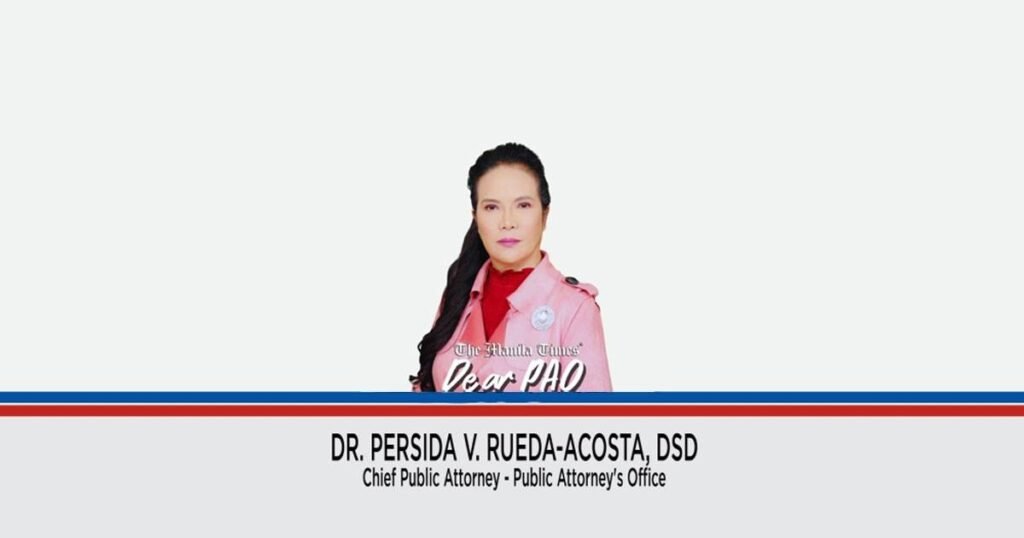Dear PAO,
My organization is planning to conduct charity works for the most neglected members of our society, like the elderly. We plan to visit a remote barangay in one municipality, and distribute rice, reading glasses, and other items to senior citizen residents. A pre-evaluation will be conducted by one of our members on the recipients of the reading glasses. However, during our consultation with a company that sells reading glasses, we were warned that we might violate a law if we distributed reading glasses without a proper examination of the recipients by a registered optometrist. Our mere intention is to help, and we do not want to get into trouble, so we would like to confirm if our plan would indeed be in violation of the law.
Terrence
Dear Terrence,
The law regulating practice of optometry is Republic Act (RA) 8050, otherwise known as the Revised Optometry Law of 1995. Under Section 3(a) of the law, “Optometry” is defined as “The science and art of examining the human eye, analyzing the ocular function, prescribing and dispensing ophthalmic lenses, prisms, contact lenses and their accessories and solutions, low vision aids, and similar appliances and devices, conducting ocular exercises, vision training, orthoptics, installing prosthetics, using authorized diagnostic pharmaceutical agents (DPA), and other preventive or corrective measures or procedures for the aid, correction, rehabilitation or relief of the human eye, or to attain maximum vision and comfort.” The law further defines “Optometrist” as “a person who has been certified by the Board of Optometry and registered with the Professional Regulation Commission (PRC) as being qualified to practice optometry in the Philippines.” (Section 3 (b), id.)
Relative thereto, Section 4 of same law clearly states that:
“Any of the following acts constitute the practice of optometry:
“a. The examination of the human eye through the employment of subjective and objective procedures, including the use of specific topical diagnostic pharmaceutical agents or drugs and instruments, tools, equipment, implements, visual aids, apparatuses, machines, ocular exercises and related devices, for the purpose of determining the condition and acuity of human vision to correct and improve the same in accordance with subsections (b), (c), and (d) hereof;
“b. The prescription and dispensing of ophthalmic lenses, prisms, contact lenses and their accessories and solutions, frames and their accessories, and supplies for the purpose of correcting and treating defects, deficiencies and abnormalities of vision;
“c. The conduct of ocular exercises and vision training, the provision of orthoptics and other devices and procedures to aid and correct abnormalities of human vision, and the installation of prosthetic devices;
“d. The counseling of patients with regard to vision and eye care and hygiene;
“e. The establishment of offices, clinics, and similar places where optometric services are offered; and
“f. The collection of professional fees for the performance of any of the acts mentioned in paragraphs (a), (b), (c), and (d) of this section.”
Your organization’s intention to distribute free reading glasses is commendable. However, the pre-evaluation to be conducted by one of your members may be considered as an act of practicing optometry. Specifically, the examination of the human eye through the employment of subjective and objective procedure and the prescription and dispensing of ophthalmic lenses and frames and their accessories for the purpose of correcting and treating defects, deficiencies and abnormalities of vision, as enumerated under Section 4 (a) and (b) of the aforesaid law, must be performed by a licensed optometrist. Otherwise, it would be deemed as an unauthorized practice of optometry which falls under Section 5 of the law:
“No person shall practice optometry as defined in Section 3 of this Act nor perform any of the acts constituting the practice of optometry as set forth in Section 4 hereof, without having been first admitted to the practice of this profession under the provisions of this Act and its implementing rules and regulations: Provided, That this prohibition shall not apply to regularly licensed and duly registered physicians who have received post-graduate training in the diagnosis and treatment of eye disease: Provided, however, That the examination of the human eye by duly registered physicians in connection with the physical examination of patients shall not be considered as practice of optometry: Provided, further, That public health workers trained and involved in the government’s blindness prevention program may conduct only visual acuity test and visual screening.”
The purpose of Republic Act (RA) 8050 was elaborated in the case of Acebedo Optical Company, Inc. v. The Honorable Court of Appeals, et al., GR 100152, March 31, 2000, where the Supreme Court, speaking through Associate Justice Fidel Purisima, stated that:
“The primary purpose of the statute regulating the practice of optometry is to insure that optometrical services are to be rendered by competent and licensed persons in order to protect the health and physical welfare of the people from the dangers engendered by unlicensed practice.” Xxx
Applying the afore-cited decision in your situation, the examination of the eye and distribution of reading glasses may fall under Section 4 (a) and (b) of Republic Act (RA) 8050. The said acts, when not performed by a licensed optometrist, are considered as unauthorized practice of optometry.
We hope that we were able to answer your queries. Please be reminded that this advice is based solely on the facts you have narrated and our appreciation of the same. Our opinion may vary when other facts are changed or elaborated.
Editor’s note: Dear PAO is a daily column of the Public Attorney’s Office. Questions for Chief Acosta may be sent to [email protected]

